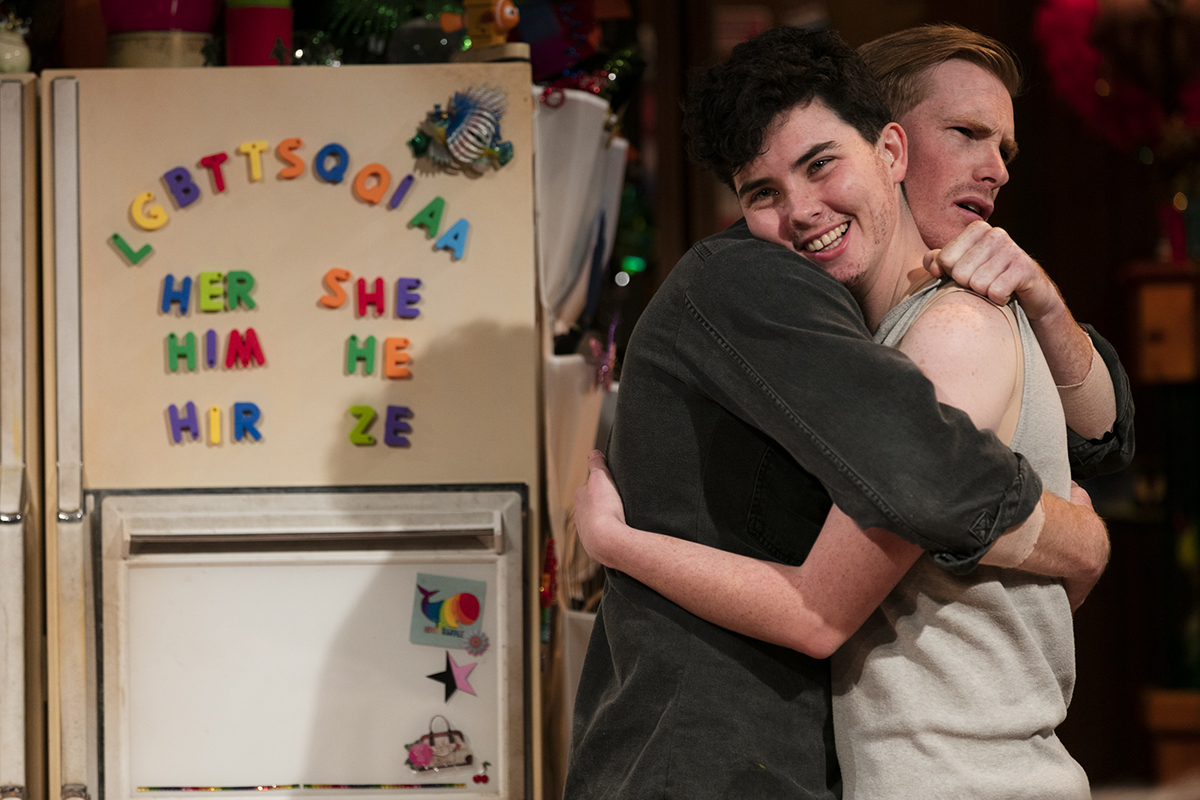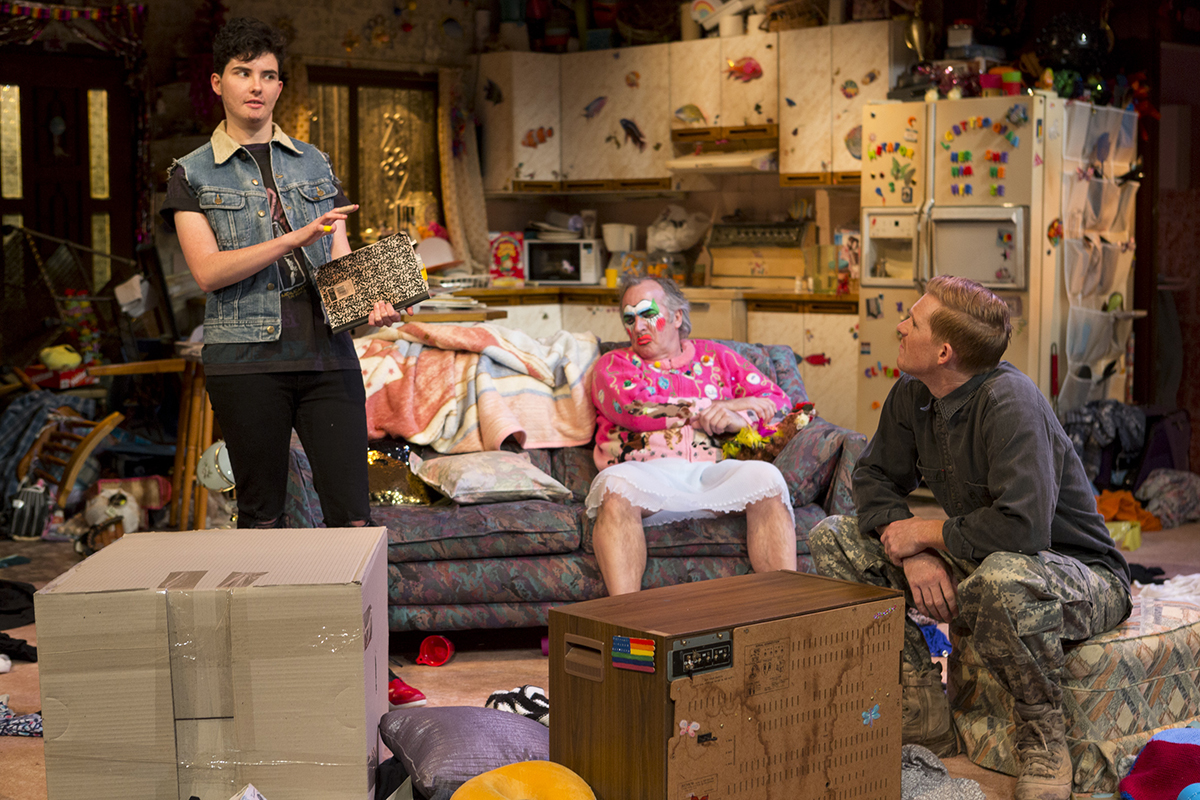
Hir: A family revolution
American playwright Taylor Mac’s Hir moves relentlessly from seemingly low farce to near tragedy, blessedly without a gun in sight, but with a needy young soldier returned from Afghanistan seeking a hero’s welcome and patriarchal order. He’ll get none of it. His working class family has changed, possibly America too.
The apparent chaos that greets him and us — an ordinary loungeroom and kitchen epically awash with scattered clothes, rubbish and unwashed dishes — is in fact a new order. The audience gasps, the ex-soldier, Isaac (Michael Whalley), screams and subsequently vomits at every instance of change. His father, Arnold (Greg Stone), appears to be a cross-dressing clown who can barely speak. His mother, Paige (Helen Thomson), has abandoned domesticity and mastered the lingo of feminism and LGBTQI politics, wielding it with a mix of wicked panache and amusing uncertainty and allowing Mac to satirise aspects of queer rhetoric, including that ever-lengthening acronym.
Worse, Arnold, who used to beat his wife and children, has had a stroke and is subject to Paige’s vengeance — dressed as a woman, fed mush, hosed down and kept cold with the aircon on (Paige’s taming of the stink of male sweat). There might not be a gun in Hir, but the competition over the control of the temperature is dangerously akin to its threat. Worse again for Isaac, his sister is now transgender Max (Kurt Pimblett), hence the play’s title, Hir, crossing his and her, and the injunction that Isaac use ‘zee’ as the preferred pronoun for Max (the arguments about transgender identity are an education). Can Isaac adjust to this new domestic order, how viable is it, especially for Max, and where does Arnold fit in, if at all? These are the questions that Mac’s characters must face as the greater part of the play unfolds and darkens between explosive bursts of comic conflict.
Although it’s clear that patriarchy has no place in this household (Arnold’s debilitating stroke is as symbolic as it is actual), the complexities of gender orientation and typecasting will endure. Paige notes that with Isaac’s arrival male moodiness is on the rise and that Max is inclining to a masculine polarity. It’s indicative of the play’s character and moral complexities that Isaac, instead of demanding the return of his sister, opts for masculinising Max, whereas Paige clings to the teenager’s gender ambiguity and their life together, which includes the “cultural Saturdays” she insists Isaac join — “[Our family] never loved art,” he retorts. Paige declares that Max has saved her life, which indicates how culturally and morally pivotal Max is to the play, even though Paige and Isaac are its actual plot drivers. While intelligent and sharp-witted, Max is too young, too easily bossed about to shape events, although a final gesture might suggest at least a developing empathy for defeated manhood. The question remains, will Max be constrained by Paige’s vague fantasy of abandoning the home and setting off into the greater world? The adolescent’s own dream for now goes no further than tentatively imagining joining a queer anarchist commune.
What is that greater world? There’s little reference to it, beyond Paige’s mention of impoverished, drug-addicted veterans hanging about the streets. Max is not palpably part of an LGBTQI community. Paige has a job with a non-profit that is clearly not part of her projected future. Hir’s isolated working class family is a microcosm of a society undergoing the transformations wrought by the weakening of patriarchy and the concomitant rise of feminism, queer culture and transgender identification. It’s strongly felt, hotly argued; there is violence, there is banishment and, finally, lingering uncertainty. Paige’s determination to pursue her vision is at once valid, given all she has suffered and been joyously liberated from, but it’s also obdurately limited, not least for Max.
The progression in the first act of Hir, from the riotous comedy of its opening and subsequent deliriously tense arguments to a not at all funny final scene with Isaac and Arnold alone (in which the son menacingly talks the father through a litany of the man’s brutalities), is indicative of the overall momentum across the whole play and its comedy-drama dynamic, from comic disruption to dark ponderings. Hir is not a classically redemptive, procreative comedy. Mac humours his audience, with a jolt, into being open to social transformation but also to its obstacles and the play ends without laughter. Arnold’s stroke, Max’s transgender status and Paige’s acceptance of that identity and of her own potential have wrought enormous change, its consequences only just being fully felt at Hir’s end.

Kurt Pimblett, Greg Stone, Richard Whalley, Hir, Belvoir Street Theatre, photo Brett Boardman
Director Anthea Williams and her cast honour the play’s distinctive drive from laughter into darkness with precise comic crafting and subtle characterisations that render the seriousness of daunting issues intelligible. Helen Thomson seems to blend Phyllis Diller’s deadpan bluntness and Samantha Bee’s vocal and gestural animation, reeling off Paige’s declarations and assaults with quick-fire screwball comedy verve, but, when events require it, revealing the woman’s fearsome determination, cruel as it can be, to never, in any way, return to her previous subjection.
Isaac, who, despite knowing too well his father’s sins, yearns for the status quo, is manipulative, hypocritical (he was a dishonourably discharged ‘hero’) and possibly suffering, as his mother suggests, PTSD (he was on a mortuary detail in the war, collecting body parts). Michael Whalley finely delineates Isaac’s homecoming astonishment, its convulsive physical consequences and his inherent rectitude, inflected with escalating desperation and with hints of trauma stress.
The role of Arnold limits Greg Stone to a narrower but no less impressively realised ambit in which he delineates a lost soul, uttering single words he’s heard, ordered about like a pet dog, confused about but embracing his cross-dressing and now and then revealing a surfacing undercurrent of anger and momentary knowledge of his plight. As required by the playwright, a transgender actor, Kurt Pimblett, plays Max with a vividly apt mix of teen confidence and confusion, caught between hir mother and brother and hir own impulses (sometimes to just to go to bed and masturbate), or attempting to extricate hirself from what Paige assumes are shared attitudes.
With Hir, Taylor Mac, who crafts many kinds of plays and performance art, has chosen to take on the American dysfunctional family genre which reaches from Eugene O’Neill to Tennessee Williams, Arthur Miller, Edward Albee and Sam Shephard, but rendered it fiercely comic, to a point, and white working class. In a program note, Mac invokes Stockton, California, the town he grew up in, as the model location for Hir. Presumably, this and like towns across the country are Trump territory, but Mac doesn’t make the connection. It’s as if the radical but difficult transformation he portrays will ensue regardless of politics. But is the microcosm of change that is Paige’s dissolving family representative of a macrocosm that includes, say, Black and Hispanic Americans? That’s too big a question for this play, though doubtless one that will be raised. Instead, Mac has focused on a class where change would seem least likely incipient and shown it painfully taking shape, like a prophetic test case.
Paige recalls being raped by a drunken Arnold. She likes to think that her subsequent dismissive shrug triggered his stroke. Hir is that kind of funny — a grim, scabrous, point-scoring battle of ideas and drives. Mac’s ending feels a tad underdeveloped and a couple of passages in the second act, one with Max struggling to play banjo, the other Paige’s spectacularly camp “therapeutic shadow play theatre,” felt somewhat awkwardly integrated if still rich in, respectively, frustration and release.
Hir is an invigorating experience, as didactic but also less so than you might expect, and utterly timely. I was reminded of Nakkiah Lui’s Black is the New White, staged by the STC earlier this year, which appropriated the Australian family comedy-drama à la Williamson, increasingly testing its limits with white and black middle class families facing home truths and crossing boundaries, social and sexual. It’s a gentler play than Taylor Mac’s, but imbued with a tough kindred spirit.
–
Belvoir, Hir, writer Taylor Mac, director Anthea Williams, performers Kurt Pimblett, Greg Stone, Helen Thomson, Michael Whalley, set, costume designer Michael Hankin, composer, sound designer Steve Toulmin, lighting designer Sian James-Holland; Belvoir Upstairs, Sydney, 12 Aug-10 Sept
Top image credit: Kurt Pimblett, Michael Whalley, Hir, Belvoir Street Theatre, photo Brett Boardman






